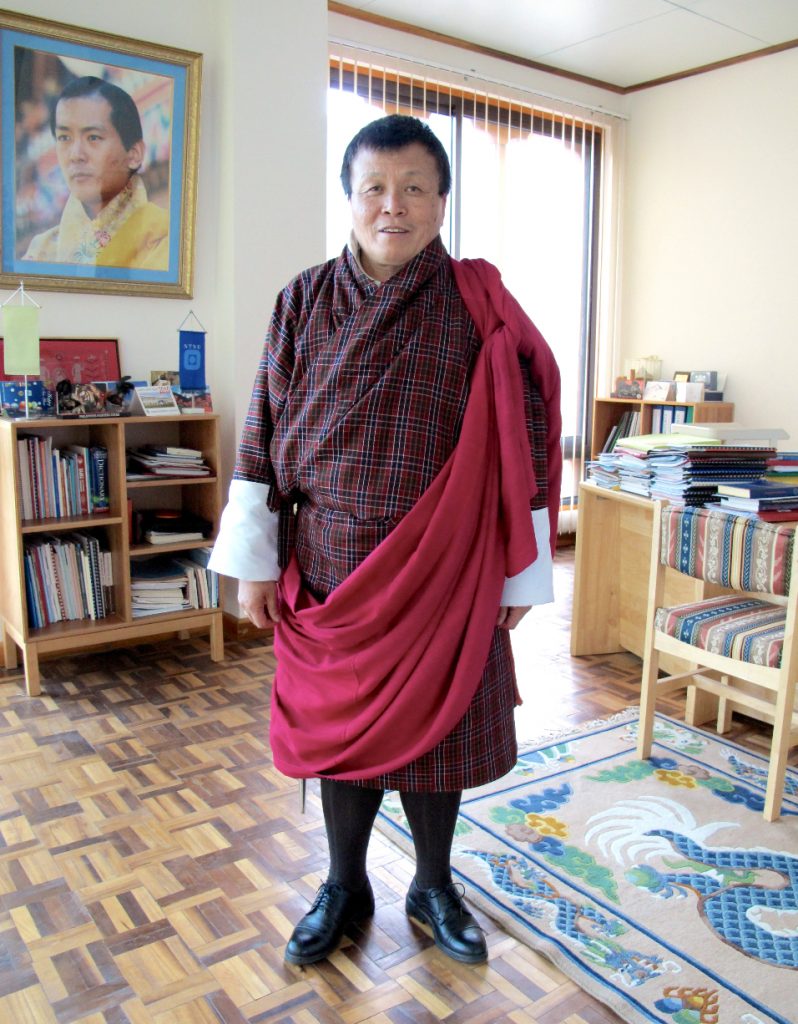Age: 60
Profession: Vice Chancellor of the
Royal University of Bhutan
Location: Bhutan
When did you become a Buddhist? That’s a difficult question. I was born into a Buddhist family in a Buddhist country. But as you get older you ask questions—What more is there? What’s there beyond? What is this life for? My interest in Buddhism increased after I turned 40, after listening to a recording of a talk that Dzongsar Khyentse Rinpoche gave in Paro College of Education in 1991. I didn’t quite believe in root gurus and all that at the time, but I found him engaging. I’ve received many teachings, including empowerment, from Dzongsar Khyentse Rinpoche in more recent years, and he has become one of my root gurus.
What was the path you took? When I was the Education Director General and eventually the Education Secretary, we encountered so many problems with our youth—difficulties with drinking and drugs and fighting. They experienced a general sense of being lost. Times were changing. We were quite conscious that something significant was missing. So we asked ourselves, what more could be done?
It dawned on us that if we could get these young people to understand themselves a little bit better, it would make a difference. Then one day in 2003 or 2004, I was traveling with the Education Minister Lyonpo Sangay Ngedup, and I mentioned a 10-day Goenka Vipassana meditation course in Kolkata, India, that I would like to attend. The Minister said, “Something like this, if you wait, it will never happen. If I were you I’d drop everything and go.”
So I found myself taking the Druk Air flight to Kolkata the next day. The 10-day intensive course really taught me a lot. I learnt that Buddhism is more than what I thought; that it is very scientific, and that it can be a way of understanding the mind. I realized that this would be a way to get our students to understand themselves.
I was convinced that Buddhist discourses and meditation could be used as a tool in our schools to get the students to understand their thoughts and emotions, and it wasn’t too difficult to convince my boss. We brought meditation instructors from India to conduct meditation programs for our teachers and for the children. They loved it, particularly the children. Our Je Khenpo, the chief abbot of the Central Monk body, also became interested, and he appointed one of his four chief masters, Yangpei Lopen, to work with us in 2003.
Is Buddhism formally presented in the schools in Bhutan? Yes. We have been conducting discourses and sessions for children and teachers continuously. We decided the best way to sustain this program is to introduce “mind training” in the teachers’ colleges. We decided that all our teachers could, in principle, finish ngondro [preliminary practice] as they finish four years of teacher training. The student teachers would at least be introduced to ngondro, whether they actually completed the entire practice or not. We have the commitment from the dratsang [the central monk body] that they will send masters every year to the two colleges of education for a period of 11 days each to give ngondro training to student teachers. In addition, The Tibetan Book of the Dead is taught to the fourth-year students, and an empowerment ceremony is conducted at the end of the eleventh day. Anyone who is interested can attend a special one-week advanced training with the lopen [master] during vacations.
It seems to me that the majority of the 700,000 Bhutanese are interested in ritual rather than the philosophy. Yes, Bhutanese are like that; there is more ritual than philosophy in our practice. But the more I understand—through reading and discourses, and taking teachings from masters—the more I think the things that we consider ritual are actually meditative states. For example, when you offer water in the morning, for that moment you are very focused and clear, you are in the present moment. I also see that a lot of these ritualistic forms like lighting butter lamps, circumambulating, doing prostrations, with meaning or without meaning, still have value because for that moment you are there. Each moment helps you bring your mind home. You have these little glimpses. So the ritualistic practices actually come pretty close to the true essence. But there is a big danger of losing that. We are losing the appreciation for the form. There is huge competition from many other stimuli such as videos and television. It’s changing so fast here.
Do you see Buddhism as a religion or a philosophy? I see Buddhism as more of a philosophy because religion has to do with a person, a central figure. While the historical Buddha is a person, in Buddhism we say that all beings have buddhanature and they have the potential to achieve buddhahood.
Some people come to Bhutan from the West expecting to experience it as a magical Vajrayana kingdom. Do you think it’s magical here? I don’t know; that’s very difficult to answer. We take Bhutan as just another place on earth, which is nothing special. But I think if you understand Buddhism, you see that the teachings that are present here in the environment, in the cultural context, make the chances of realizing your true self greater. We feel lucky. But it’s easy to miss.
Are you a vegetarian? No. But I could be. Many young Bhutanese increasingly turn vegetarian, which I think is very good.
—Noa Jones
Thank you for subscribing to Tricycle! As a nonprofit, we depend on readers like you to keep Buddhist teachings and practices widely available.
